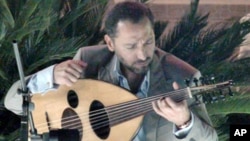With Iraq suffering from sectarian violence, lack of a new government and such basic services as electricity, the arts would seem far down the list of national priorities. But one Iraqi, in self-imposed exile in Egypt, believes music is just as important in making the battered country whole again.
Naseer Shamma delivers his unlikely message from the narrow alleys in the Hussein district of Cairo. It's not easy to find his House of Oud - a lute-like instrument - in the maze that makes up this ancient quarter. But the sight of a young man, a distinctive case slung over his shoulder, proves a guide. It's Saturday night, and he's on his way to take part in the revival of one of the Arab world's oldest forms of music.
The student joins his fellows in the courtyard of the House of Oud, where a dozen or so masters work on an especially difficult passage. In a room nearby, beginners tackle simpler pieces. Tucked into an adjacent hallway, a trio strum idly as they rest and talk. They are young and old, men and women, students from Syria and Lebanon, Europe and Japan, even an American from Malaysia.
Shamma says this is his dream. "This is the best bridge between us," he adds. "The best way [is] if we have different ways to meet each other."
Sitting in his office high up in the old house, Shamma is trim, youthful and exudes a serenity and joy that belies his past. At 47, he is of the generation thrown onto the frontlines of the horrific 1980's war between Iraq and Iran. He spent 170 days in prison for allegedly slandering former leader Saddam Hussein.
But, he says, nothing has hurt the social and cultural fabric of his country more than the last seven years of the U.S.-led war.
He concedes that Saddam's rule was a dictatorship, and that danger was rife. But nobody, he says, would ask about religion, everybody lived together, with good relations. "Now, this is after the occupation," he says, "everything, it's destroyed."
Shamma says he believes that the strength of the Iraqi people will prevail, to rediscover what he calls the nation's "cultural vigor." But he refuses to return to his homeland until American forces leave.
He makes vicarious visits via the Iraqi Embassy in Cairo, where officials seem to share his belief in the power of culture. Despite the pressing problem of no government back in Baghdad, the ambassador makes time to inaugurate a series of cultural salons, luring Iraqi and Egyptian intellectuals on a recent evening with a performance by Shamma.
In the garden of a former royal palace, Shamma leads a small orchestra, or takht, in playing both traditional pieces and those of his own composition. At one point during the concert, he plays the oud with a single hand. It's a method he perfected to help a friend who lost his hand in the Iran-Iraq war and can be used by anyone with such a disability.
It's but a small part of Shamma's efforts to help others. His concerts raise money for U.N. refugee programs and to sponsor Iraqi children getting medical help abroad. And in keeping with his overriding belief in music as a way to bring people together, he has established music schools across North Africa, in the Palestinian territories and Sudan. He hopes that by next year, there will be Houses of Oud in Iraq.
He is also always on the lookout for new talent. During a break from rehearsal, Oud player Youssef Abbas explains how, on a television show in his native Iraq, he boastfully challenged Shamma. The master rose to the occasion and invited him to study in Cairo. At 14, Youssef is one of the younger musicians at the House of Oud.
Syrian buzuq-player Jwan al-Farhan showed his eagerness more dramatically, defying orders from his commander in the Syrian army, to sneak out of his barrack to hear Shamma play. His devotion landed him in prison, and later, an invitation to Cairo.
These are the stories that make Shamma convinced he made the right decision 13 years ago, when he chose Cairo over London as his new home base. He was convinced by supporters in Egypt that Arab music should be based in the Arab world, while welcoming all others who want to come and learn and share.
"There is a very great tradition in Arab houses in general," he says. "They enjoy so much the people coming to the house." His idea is to make the House of Oud open for everybody. With a laugh surprisingly free of bitterness, he adds, but only if they come as a friend, not an occupier.









